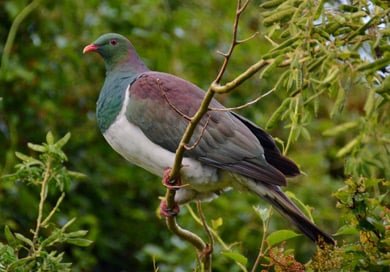Why monitor?

Kererū can be a good indicator species to monitor
Image: Shellie Evans ©
Monitor native species to:
- form an inventory of which native species are present and at what levels
- define and track progress towards your goal
- build a sense of achievement in your group
- compare the health of your site with that of others around New Zealand.
Monitor mammalian predators to:
- determine which predators are present and at what levels
- identify pest invasions and operational failures requiring improvement.
It can be essential to have monitoring results when applying for funding and promoting your group.
Monitoring native species
To meet your goal, you’ll need to monitor the native species you aim to protect. It’s called outcome monitoring, and it can be done by small or large projects.
About indicator species
Indicator species make a great choice for monitoring. They'e sensitive to predatory threat, representative of the other organisms in the ecosystem, easily observable and able to be sampled. Examples include kererū, tree wētā, bellbirds and tree fuchsia.
Your Predator Free Ranger can help you pick suitable indicator species.
How to monitor native species
Five-minute bird counts are an easy way to find out which native birds are present and to monitor them over time.
Other monitoring methods:
Monitoring pests (optional)
For backyard projects, see backyard trapping.
If your protection area is larger, you’ll benefit from monitoring pest populations. This is called output monitoring.
How to monitor pests

